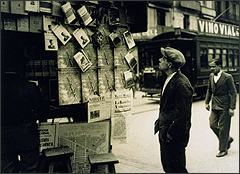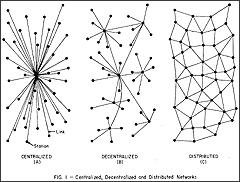Líneas de investigación
Proyectos en Curso
Proyectos Anteriores
 Publicaciones (no solo) de arte: usos culturales, sociales y políticos
Publicaciones (no solo) de arte: usos culturales, sociales y políticos  Seminar-Meeting Publications on (not only) art: cultural, social and political uses
Seminar-Meeting Publications on (not only) art: cultural, social and political uses
Seminar-Meeting Publications on (not only) art: cultural, social and political uses |
|
Date: 15th - 18th June 2011
PRESENTATIONPRESENTATION
This seminar aims to explore current editorial activity in the field of art and the arts, with a programme that will take place over four days in two venues: the Universidad Internacional de Andalucía and the Centro experimental y tecnológico para la cultura y las artes de Sevilla. The first part of the programme will cover print publications, looking at the history of six outstanding international art magazines and at four publishing projects that have recently been launched by museums and arts centres run by the Spanish government. The second part will concentrate on on-line publishing proposals, using as case studies both projects that are relevant for their broad media influence and others that have put new strategies into action to harness the power of the Web. If, as Gerald Rauning says, the place for critics is where the social engines of resistance meet the actual engines of text, then at this meeting we shall try to find out whether the art publications we shall be analysing, as well as the models (discursive, aesthetic, functional) they suggest, can be valid tools to promote criticism and the spread of knowledge, or whether they are merely instruments to legitimize the institution of art. Can these publications become spaces for critical resistance to expose and analyse the present function of art under capitalism? Could they become platforms from which to propose new ways of understanding art and explore new channels of creation, action and thought, beyond the dictates of the market and institutional cultural policies?
PROGRAMME UNIAPROGRAMME UNIA arteypensamiento The work of art, according to a concept born in Germany at the end of the 18th Century, which has now gained dominance, is the agent of its own criticism. It has been this way since Friedrich Schlegel, Novalis and the rest of the group responsible for the magazine Athenaeum identified works of art as fragments that contain within themselves, in their relationship with each other, an impulse for continuous questioning and review. Despite this belief, however, arts criticism (visual or literary) has mainly taken the form of a discourse accompanying art but which is not art in itself. This is also the case with art produced since the end of the 1960s, art that seems to have strengthened the critical impulse identified by the early romantics. Since the 1970s, art criticism has taken the form of a series of publications with different institutional attitudes and positions. Attracting larger or smaller readerships, they have suggested various ways of understanding art as a cultural product, a social and perhaps political practice. On the first day of the seminar we shall analyse a series of key examples of publications from the past thirty years, such as October, Ramona and Third Text, each marking a significant moment in the recent development of publishing in response to socio-political circumstances or technological advances (for example the dismantling of state Communism in Eastern Europe or the emergence of DIY publications online). By studying these important examples we shall raise questions, such as what formats and distribution models are possible today and what effects do they have on content and public? What institutional relations make certain publications possible? How does a publication function that is seen as an institutional organ or as belonging to artists? What is the effect of different ways of understanding language and translation, on the production and distribution of discourse? The second day will be devoted to a phenomenon that has arisen in Spain in the past year: the publication and circulation of magazines launched by some of the major museums and arts centres. This policy has various motives and aims: to support the work being done by their different programmes in disseminating and studying contemporary art; to build closer ties between institutions and society and to win new audiences through more accessible publications; economic reasons, since some of these magazines are substitutes for catalogues. We shall discuss with those in charge of these publications their texts and contexts, their functions, areas of competence and aims.
PROGRAMME I+CASPROGRAMME I+CAS
This seminar would seek to contextualise this question with a more generalised analysis of collaborative publishing production. Starting with a selection of pilot projects, will be investigated as 'on-line publishing' and/or 'on-line journals' are now moving towards a mode of group learning or self-education, which occasionally even sets itself up in direct opposition to existing routes of learning. Buoyed by the free digital content circulating all around them, these collective endeavours can pull in inestimable intellectual resources, on the base of a fluid, yet intensely committed, contributor base. On-line publishing, here, should be seen as extending far beyond the visible platform of exchanges and uploads, to all the necessary production processes preceding 'publication', extending to Skype conversations, group editing/commenting, and supplementary email lists. While one could argue these merely mirror corporate workflow processes, a more hopeful interpretation is that they offer the potential for fundamental reinterpretations, and evolutions, of the editorial process, and have the capacity to deeply influence the 'text'.
COMPLETE PROGRAMMECOMPLETE PROGRAMME UNIA arteypensamiento Wednesday_15th June 2011 · 10:00 a.m. - 2:30 p.m. · 6:00 - 9:30 p.m.
· 10:00 a.m. - 2:30 p.m. · 6:00 - 8:30 p.m. · 8:30 - 9:30 p.m.
Friday_17 th June 2011 · 10:00 a.m. - 2:30 p.m. · 6:00 - 8:00 p.m.
· 12:00 p.m. · 6:00 - 8:00 p.m. · 8:30 p.m.
PARTICIPANTSPARTICIPANTS AFTERALL is a research and publishing organisation based in London that focuses on contemporary art and its relation to a wider artistic, theoretical and social context through Afterall Online, Afterall journal and Afterall Books. In 2010 UNIA arteypensamiento became co-editor of the Afterall Journal, published three times a year, which includes in-depth studies of the work of contemporary artists as well as essays on artistic, theoretical or political issues relevant to the production and experience of art. http://afterall.org Pablo Lafuente is co-editor of the Afterall Journal and Afterall Books. He is head of the postgraduate programme MRes Art: Exhibition Studies at Central St Martins in London and curator of the Norwegian show at the 2011 Venice Biennale. CARTA is a biannual print publication produced by the Museo Nacional Centro de Arte Reina Sofía (MNCARS). Its name refers both to its printed nature and to correspondence or geographical location, and its aim is to open up debate and reflection on the museum’s programme as a whole. It is a magazine for thought and discussion that seeks to disturb the classic mechanisms of contemporary culture, following strands usually marginalised by museums. http://museoreinasofia.es Jesús Carrillo is Head of the Department of Cultural Programmes at the Museo Nacional Centro de Arte Reina Sofía (Reina Sofia National Museum and Arts Centre) and lecturer in History and Theory of Art at the University of Madrid. DE 11 A 21 is a quarterly publication by the Centro Andaluz de Arte Contemporáneo (CAAC). Its format (more agile, dynamic and accessible than that of exhibition catalogues) is a response to a new approach to the centre’s annual programme, structured around monographic sessions around which all other activities revolve. It aims to have an impact on critical thinking and the spread of knowledge, establishing links to bring the public closer. It can be downloaded from the CAAC website in Spanish and English. http://www.caac.es Luisa López Moreno is Museum Keeper and Head of the Activities and Outreach Service at the Centro Andaluz de Arte Contemporáneo (Andalucian Centre of Contemporary Art, CAAC). ÍNDEX is a biannual publication of the Museu d’Art Contemporani de Barcelona (MACBA) on artistic research, thought and education. The journal aims to generate a new bibliography that participates in the renewal of culture and to become a test bed for the construction of a new critical language that encourages thinking from and through art. It comes out every May and October and will be distributed free of charge in three languages: Catalan, Spanish and English. http://macba.cat Clara Plasencia has been Head of the Publications Department of the Museu d’Art Contemporani de Barcelona (Barcelona Museum of Contemporary Art, MACBA) since 2006. MUTE is an on-line magazine dedicated to exploring culture and politics after the Net. Based in London, Mute combines quarterly issues dedicated to specific topics with regularly updated articles and reviews. The site also features ongoing coverage of relevant news and events contributed by ourselves and our readers. Mute also publishes a quarterly book (aka Mute Vol. 2) and is also an on-line multi-media resource, with a Public Library where readers can contribute reviews as well as upload media files. http://www.metamute.org Pauline van Mourik Broekman is the publisher and co-founder of Mute. She has written and spoken widely on culture and technology, the politics of institution-building and publishing magazines in the ‘digital era'. NEW MEDIA CENTER_KUDA.ORG is an independent cultural organization based in Novi Sad, Serbia. Since 2001, it has brought together artists, theoreticians, media activists, researchers, and the wider public in research on new media technologies, cultural relations, contemporary artistic practice, and cultural policies. Kuda has organized presentations by visiting artists and theorists, workshops, exhibitions, conferences and an internationally oriented publishing project. Since 2005, kuda has also dealt extensively with the preservation and actualization of Yugoslav political art movements. Representated by Branka Curcic. http://kuda.org Branka Curcic is an art critic and program editor in the New Media Center, kuda.org, Novi Sad, Serbia, where she acts as editor of the publishing project kuda.read. OCTOBER is a peer-reviewed academic journal specializing in contemporary art, criticism, and theory, published by the MIT Press. October was established in 1976 in New York by Rosalind Krauss and Annette Michelson. The journal was an important participant in introducing French post-structural theory on the English-speaking academic scene, and the journal became a major voice interpreting postmodern art. http://mitpressjournals.org/loi/octo Adrian Rifkin is Professor of Art Writing in the Department of Art at Goldsmiths, London University. RADAR was born with the aim of giving theoretical backing to the dissemination and study of contemporary art carried out by MUSAC. It comes out twice a year, in Spanish and English, and each issue is a monograph. Its editorial board is made up of recognised experts in subjects connected to contemporary art, such as Ute Meta Bauer, Hamid Dabashi, Estrella de Diego, Patricia Falguières, Andrea Giunta and Hou Hanru. http://musac.es María Inés Rodríguez is Chief Curator of Museo de Arte Contemporáneo de Castilla y León (MUSAC), where she directs the Collection Art and Architecture. The first issue of RAMONA came out in April 2000 and, over 100 monthly issues, it explored theory and research into the visual arts. From the start this Argentinian magazine represented, in many different voices, the diverse opinions and points of view of artists, reflection on art and open discussion. It now continues through ramonaweb. http://ramona.org.ar Cordula Daus is an author and cultural researcher based in Berlin. She was coordinating editor of documenta 12 magazines, researching arts magazines and artistic practices in Latin America, Spain and Portugal. TEXTE ZUR KUNST stands for controversial discussions and contributions by international writers on contemporary art and culture. The quarterly magazine, founded in Cologne in 1990 and published in Berlin since 2000, offers interviews, roundtable discussions and extensive reviews on art, film, music, market and fashion as well as on art history, theory and cultural politics. Since 2006 the comprehensive main section, each time devoted to a different topic, and selected reviews are published in both German and English. http://textezurkunst.de Helmut Draxler is an art historian, art critic, curator, and Professor of Art Theory at the Merz Academy in Stuttgart. He writes extensively on contemporary art and theory for a variety of international magazines and artists’ catalogs. THE THING was founded in 1991, when it took the form of a dial-up bulletin board system (BBS) that facilitated discussion and experimentation, primarily within the New York City arts communities. Since then,The Thing has provided a flexible and supportive venue for developing, presenting and distributing innovative forms of on-line activism, media art and cultural criticism concerned with exploring the possibilities of electronic networks. http://the.thing.net Wolfgang Staehle is a video artist, and founder and Executive Director of The Thing. THIRD TEXT is an international journal providing critical perspectives on art and visual culture. Founded in 1987 in UK, it examines the theoretical and historical ground by which the West legitimises its position as the ultimate arbiter of what is significant within this field. Third Text provides a forum for the discussion and reappraisal of the theory and practice of art, art history and criticism, and the work of artists hitherto marginalised through racial, gender, religious and cultural differences. http://thirdtext.com John Roberts is Professor of Art & Aesthetics at the University of Wolverhampton, and has contributed to journals like Radical Philosophy, Historical Materialism, Third Text or Manifesta. URBANOMIC is a publisher and arts organization based in the UK that proposes a renegotiation of the relationship between philosophy, science and art. Since 2006, they publish Collapse: Journal of Philosophical Research and Development, that brings together new work by, and in-depth interviews with, contemporary artists and philosophers. They also have their own project space in Falmouth, and publish monographs documenting and developing their projects. http://urbanomic.com Robin Mackay is a philosopher and director of UK arts organization Urbanomic where he also acts as editor of Collapse: Journal of Philosophical Research and Development. VALDEZ is a magazine based in Bogota with two fundamental political positions: its independence from commercial structures and its refusal to grow into something else. It began as a local dialogue between friends in Colombia and since then has continued to analyse the social effects of every “technological thing”. María Berríos is an independent writer and researcher living and working between Santiago de Chile and London. She was editor for Latin America of documenta 12 magazines.
|
|||


